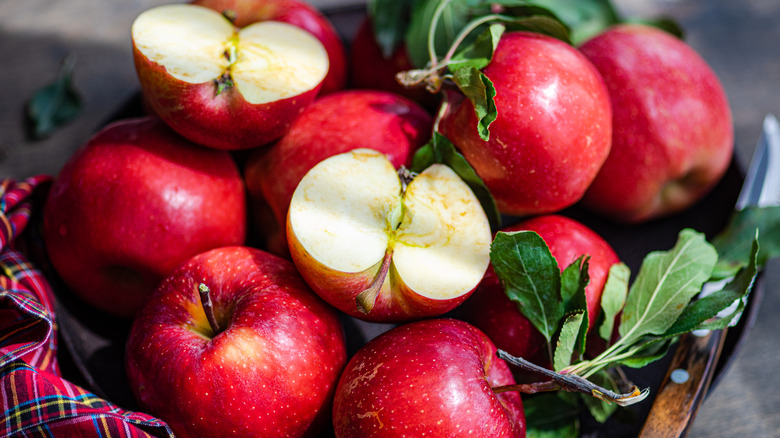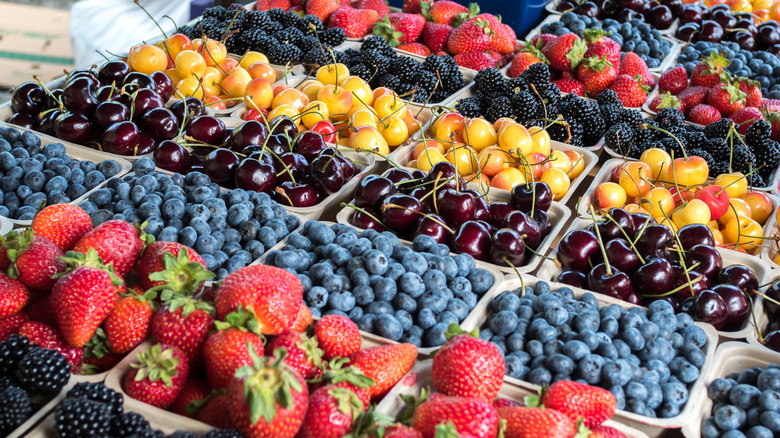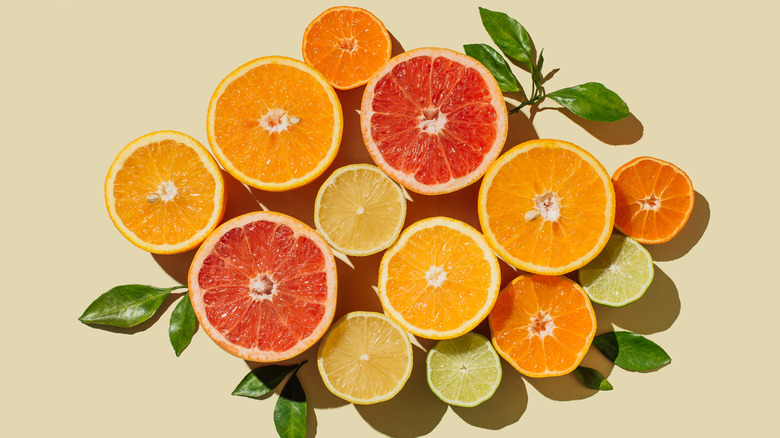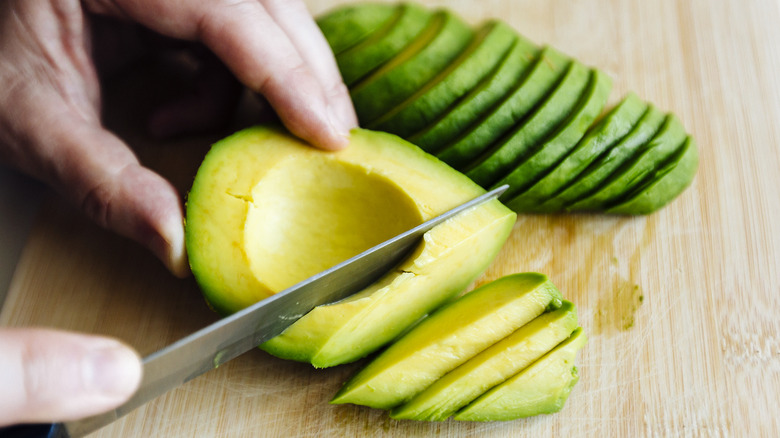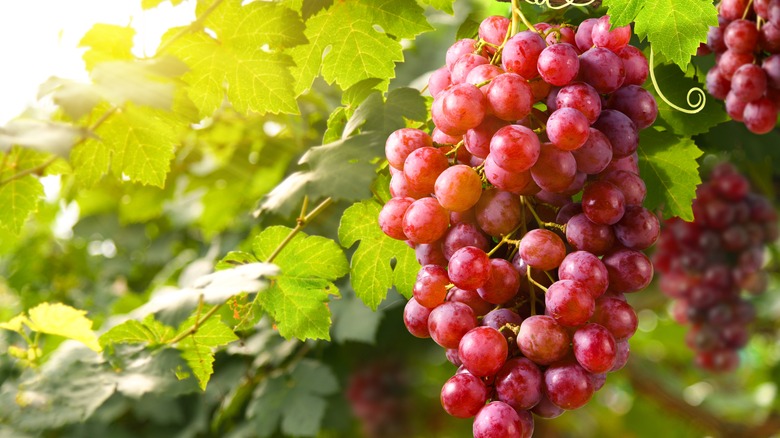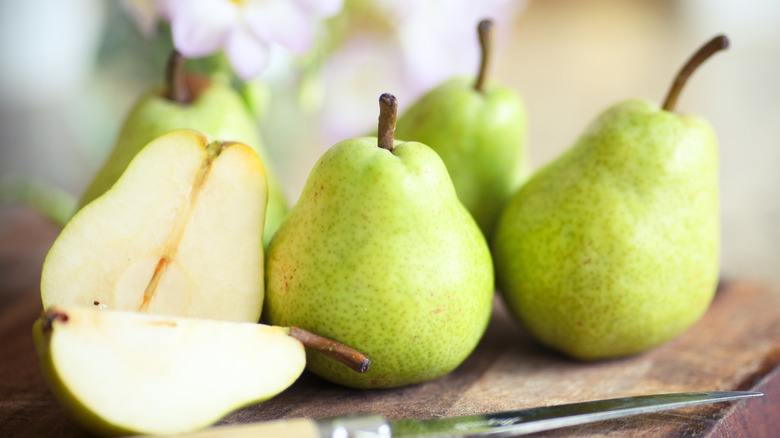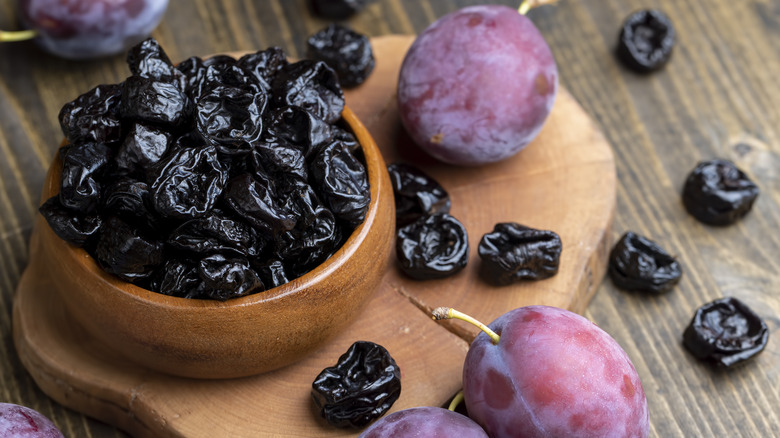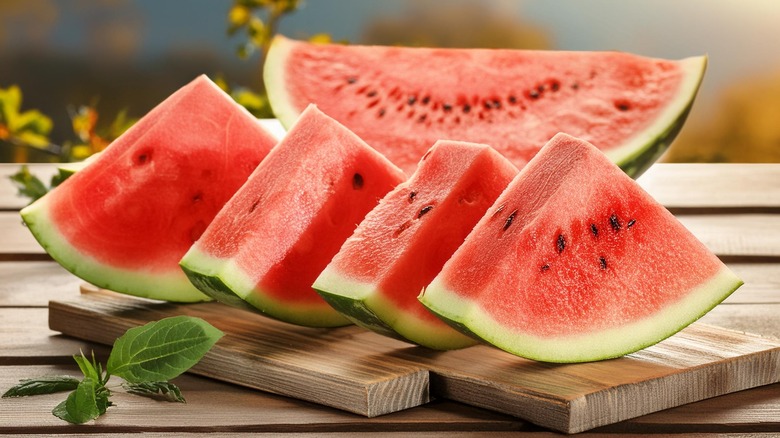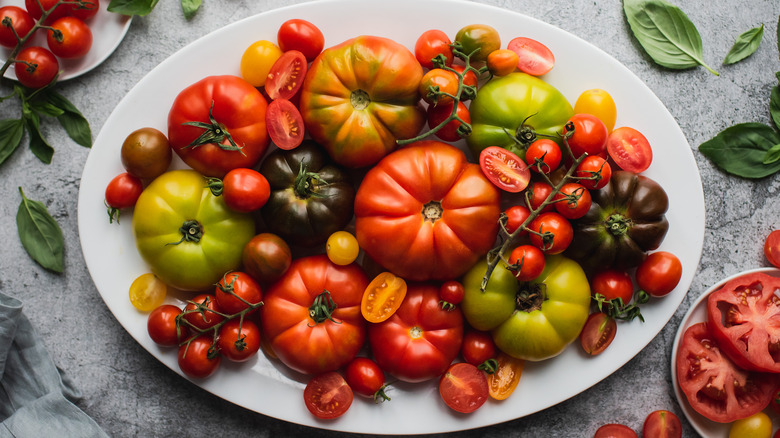10 Fruits That Can Lower Cholesterol And Blood Pressure At The Same Time
Imagine tackling two of the biggest threats to your heart — high cholesterol and high blood pressure — simultaneously. This can become a reality simply by adding a rainbow of delicious fruits to your plate. No complicated diets or superfoods required. Some fruits aren't just packed with sugary flavor; they're also armed with potent nutrients that actively lower both high cholesterol and high blood pressure. It turns out that nature's candy, from mouthwatering berries to juicy citrus and more, holds the secret to boosting heart health.
If you struggle with high cholesterol and high blood pressure, you're not alone. Nearly 38% of adults in the U.S. have high cholesterol, and about 43% have high blood pressure (also called hypertension), according to WebMD. However, more than 60% of people with high blood pressure also struggle with high cholesterol. Unfortunately, these medical conditions increase your risk of heart disease and stroke, and when you have both, it compounds your risk.
The good news? Changes in lifestyle, like diet and exercise, can make a big difference. Many doctors suggest taking up the DASH diet — Dietary Approaches to Stop Hypertension — which minimizes fatty foods, salt, red meats, and sweets. While refined sugar is off-limits, fruit remains a delicious option, and plenty of fruits can be your heart's best ally. Let's explore ten tasty fruits that can double up as your heart's best teammates in the fight against high cholesterol and hypertension.
Apples
An apple a day may actually keep the doctor away. Apples have been found to not only lower cholesterol but also reduce high blood pressure levels, on top of balancing blood sugar and boosting gut health (per the Cleveland Clinic). A 2019 study in the American Journal of Clinical Nutrition found that eating not one apple a day, but two, for 8 weeks helped lower cholesterol levels (and keep the doctor away, of course). Other studies confirm that consuming several apples each day can lower cholesterol levels anywhere from 5% to 8%.
The antioxidants and fiber in apples can also help reduce high blood pressure and boost heart health. After analyzing over 20 years of dietary data, researchers have found that apples rank among the top fruits for reducing the risk of high blood pressure, according to a 2015 meta-analysis in Hypertension. If you don't like biting into apples on the daily, try adding fresh-cut apples into meals like yogurt, cereal, or oatmeal. You can also add them to a smoothie, or incorporate dehydrated apple chips into your snack rotation (just make sure there's no added sugar).
Berries
Bring in the berries! Not only are they super sweet and delicious, but they also deliver a wide range of health benefits, since they're rich in vitamins and minerals that boost overall well-being. Berries like strawberries, blueberries, and raspberries are also packed with antioxidants like flavonoids and anthocyanin, which not only help reduce oxidative stress in the body but can also balance blood pressure and lower cholesterol levels. A 2022 study in Nutrients found that a wide range of berries, including chokeberries, cherries, blackcurrants, blueberries, and raspberries, showcased promising results for decreasing blood pressure in those experiencing hypertension.
Berries have also been shown to influence healthy blood sugar and insulin levels, as well as promote healthy skin, and even reduce your risk for cancer. Berries are also believed to have anti-inflammatory properties that help lower inflammation in the body, a key factor in serious health conditions like heart disease, diabetes, obesity, and more.
Citrus
Refreshing, vibrant, and colorful, citrus fruits pack a punch when it comes to the nutrition department. Citruses like oranges, grapefruits, limes, and lemons are rich in vitamins and minerals, including B vitamins, potassium, phosphorous, magnesium, copper, and most importantly, vitamin C, which is famous for boosting immunity and skin health. On top of that, citrus fruit offers a wide variety of health benefits, including reducing blood pressure and cholesterol, combating cancer, supporting kidney and brain health, and more (per Healthline).
Drinking citrus juice or eating their fruits has been shown to lower the risk of developing kidney stones (which can be very painful!) Citrus also contains high amounts of antioxidants like flavonoids, which have been linked to reducing the risk of certain cancers, such as lung, esophageal, stomach, breast, and pancreatic cancers. These antioxidants can also help lower cholesterol levels and blood pressure. A 2013 study published in ARYA Atherosclerosis Journal suggests that drinking orange juice for at least one month effectively lowers blood pressure, while a 2017 review in Critical Reviews in Food Science and Nutrition showed that consuming grapefruit helped reduce high blood pressure in individuals.
Avocados
Did you know avocados are a type of fruit? Though they are usually considered a savory food, avocados are actually a type of berry that is packed with nutrients that benefit our physical and mental health, including heart health. Avocados are full of healthy monounsaturated fatty acids, plus other vitamins and minerals such as riboflavin, niacin, folate, magnesium, potassium, and vitamins C, E, K, and B6. They also contain a type of plant sterol called beta-sitosterol that is known to help promote healthy cholesterol levels in the body.
Avocado's rich fiber and healthy fat content make them a great food for reducing the risk of heart disease, according to Medical News Today. A 2022 study in the British Journal of Nutrition reports that eating avocados has been linked with lower rates of hypertension in Mexican women. Plus, a 2023 study in Cureus confirmed "that incorporating avocados into the diet can be a beneficial dietary strategy for individuals aiming to lower their cholesterol levels and promote heart health."
In addition, avocados have been associated with supporting vision and bone health, aiding in cancer prevention, improving digestion, and alleviating symptoms of depression. They are high in folate, a B vitamin that, when deficient, has been linked to an increased risk of depression (via Medical News Today).
Bananas
It's no secret that salt is not the best culinary spice for heart health. Many doctors recommend limiting or cutting out salt from the diet completely if you struggle with high cholesterol or high blood pressure. Potassium, on the other hand, can help mitigate the effects dietary salt has on our cardiovascular system. Consuming foods rich in potassium helps your body process and filter out salt. However, most adults, on average, fall short of meeting the recommended daily intake of potassium. "Potassium is a mineral that is vital for heart health, especially in terms of blood pressure management," Colleen Spees, an associate professor of medical dietetics at Ohio State University Medical Center, told the American Heart Association.
One food that's rich in potassium? Bananas. One medium-sized banana contains around 450 milligrams of potassium, which is about 17% of the daily potassium needed for women and about 13% for men. Bananas also contain fiber, folate, antioxidants, and vitamin C, which have been shown to reduce the risk of heart disease and lower cholesterol levels, according to Medical News Today. Another bonus: bananas are excellent for digestive health and make up the "B" in the well-known BRAT diet — which stands for bananas, rice, apples, and toast — a doctor-recommended approach for easing digestive discomfort and diarrhea.
Grapes
While bananas are popular for being a potassium-rich food, many people aren't aware that grapes are also a great source of potassium, a nutrient that helps balance blood pressure. A half-cup of raisins contains more potassium than a medium-sized banana, according to the American Heart Association. Grapes also contain a high amount of vitamins and minerals, as well as the antioxidant resveratrol, which is known to have anti-inflammatory properties that boost overall health and wellness. Many studies state that resveratrol can lower both high cholesterol and blood pressure. Some studies also suggest that resveratrol can boost brain cognition, memory, and mood (via Healthline).
"The scope of the potential health benefits is so broad — cardiovascular, brain, bladder, colon — the list just goes on," Dr. John Pezzuto told the American Heart Association. Grapes also contain high amounts of vitamins A, C, D, E, K, B1, B2, and B6, as well as copper and manganese. This nutrient powerhouse fruit may also help reduce inflammation, lower the risk of certain cancers, boost eye health, balance blood sugar, and reduce the risk of developing diabetes.
Pears
Pears are loaded with vitamins and minerals that support heart health, balance blood pressure, lower high cholesterol, and offer numerous other benefits. One medium-sized pear contains high amounts of vitamin C (9% of the recommended daily value) as well as folate, vitamin K, potassium, copper, and polyphenol antioxidants. According to Healthline, copper helps boost the immune system and promotes the metabolism of cholesterol, while potassium supports overall heart health. Pears also contain a wide variety of beneficial plant compounds and antioxidants thought to help reduce inflammation and lower the risk of heart disease, as well as other serious medical conditions like type 2 diabetes.
The outer peel of pears is rich in quercetin, a powerful antioxidant known for its potential heart health benefits. Quercetin is believed to help reduce inflammation and lower high blood pressure and cholesterol, keeping heart disease in check. A 2019 study in Food and Function found that consuming 2 medium pears every day for 12 weeks lowered high blood pressure in study participants with metabolic syndrome.
Prunes
Known for building healthy bones and keeping things regular, prunes are also a great source of heart-healthy nutrients. Prunes, which are really just dried-up plums, are probably most famous for their ability to ease constipation due to their high fiber content. They are also a potassium-rich food, helping promote heart health and healthy blood pressure levels. A 2010 study published in the Journal of Ayub Medical College Abbottabad showed that daily consumption of prunes lowered both cholesterol and blood pressure levels.
Prunes also contain high amounts of iron, riboflavin, niacin, copper, and vitamins K and B6, helping to combat anemia and boost bone health. They have also been found to be a good source of polyphenols, which have powerful antioxidant and anti-inflammatory properties that promote overall health and wellness. According to Healthline, these polyphenols have been linked to better digestion, nervous system support, heart health, blood vessel strength, and more. Prunes have even been found to promote a balanced and healthy gut microbiome.
Watermelons
Watermelon is considered the number one food to eat to help lower blood pressure, according to registered dietitian Lauren Manaker (via EatingWell.) That's because it contains not just one or two — but three — nutrients that support healthy blood pressure: L-citrulline, lycopene, and potassium. Remember, potassium aids your body in processing and filtering dietary salt, which helps maintain balanced blood pressure levels. Consuming excessive sodium can negatively impact heart health. L-citrulline is an amino acid that may increase bodily nitric oxide levels, a compound that helps relax blood vessels and reduce blood pressure. A 2016 study in Blood Pressure found that watermelon "reduces systolic and diastolic blood pressure in prehypertensive and hypertensive individuals."
Last but not least, watermelons also contain lycopene, an antioxidant that has been shown to help promote healthy blood pressure levels and cholesterol, according to Harvard Health Publishing. Lycopene is what gives watermelon its vibrant reddish-pink color, which can also be found in other colorful foods like red bell peppers, sweet potatoes, papayas, and tomatoes.
Tomatoes
Although tomatoes are commonly classified as a vegetable, they are technically a fruit, and are packed with lycopene, the same powerful antioxidant in watermelons that can enhance cholesterol levels and help lower blood pressure. A 2024 study in the European Journal of Preventive Cardiology showed that not only did eating tomatoes lower high blood pressure, but it also reduced the risk of developing the condition altogether by a whopping 36%. The study concluded that tomatoes are beneficial in both preventing and managing hypertension.
Lycopene has also been linked with boosting immunity and reducing the risk of developing certain cancers (per WebMD). Tomatoes also contain high amounts of potassium, vitamins B and E, and other important nutrients. Tomatoes are also rich in the antioxidant lutein and a carotenoid known as zeaxanthin, both of which have been associated with protecting the eyes from the blue light emitted by digital devices such as smartphones and computers.


